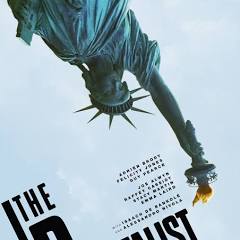Culture and Religion
Are Miracles Real? A Conversation With Eric Walberg
- Written by Eric Walberg Эрик Вальберг/ Уолберг إيريك والبرغ

Jews and gays - birds of a feather
- Written by Eric Walberg Эрик Вальберг/ Уолберг إيريك والبرغ
Ben Stein, noting that about 60% of the top positions in Hollywood are held by Jews, says "Do Jews run Hollywood? You bet they do - and what of it?" Well, let's look at what this spectacular freedom for Jews during the past half century has resulted in:
*Israel and America are terrorizing the entire world with unrelenting, vicious, bloody wars and occupations.
*The collapse of the only serious attempt (if it was indeed serious) by Israel to make peace with the Palestinians in the mid-90s and the subsequent ascendancy of the Zionist neocons in Washington have ended any illusions about the innocence of the Jews in all this.
The Brutalist: Jewish angst, holocaust (minus the genocide)
- Written by Eric Walberg Эрик Вальберг/ Уолберг إيريك والبرغ

Dubbed an epic, one of 2024's best films, I had great expectations for The Brutalist. I thought it was about an actual Hungarian architect-immigrant, maybe a fictionalized Frank Gehry, who emigrated to the US in 1947 and became a world-famous architect. Gehry's life journey was similar to the fictional Lazslo Toth, though his parents emigrated from Poland to Canada in 1929 and on to the US.
Reformation vs counterreformation ~ Gaylib vs reparative therapy
- Written by Eric Walberg Эрик Вальберг/ Уолберг إيريك والبرغ

Man is certainly not born, but made man. (Erasmus)
It’s easier to fool people than to convince them they have been fooled. (Mark Twain)
Fixation exists across all levels of the biological hierarchy, from cells to behavior, and therefore constitutes a fundamental variable in all life. Fixations are an obsessive preoccupation with a single idea, impulse, or aim which interferes with normal behavior. In Freud, the id attaches to an object, leading to fetishism.
It is fundamental to human society; before capitalism as religious rituals, in our secular age, culminating in commodity fetishism, a fixation essential to capitalism, an economy defined by consumption. Where advertising is a form of behavioral conditioning, everybody will be perfectly pacified as long as their needs and wants are conflated in their own minds. No strife, no angst.
The most fundamental fixation of all is the male-female mutual sexual fixation,
Disabusing disability: Review of Andrew Solomon, Far from the Tree: Parents, Children, and the Search for Identity (2012)
- Written by Eric Walberg Эрик Вальберг/ Уолберг إيريك والبرغ

This weighty tome by Andrew Solomon, "one of the ten best nonfiction books of 2012" according to the New York Times, is a fascinating read—chock full of gripping testimonials from a wide range of parents and their children, afflicted and/or blessed by their disabilities, describing how they struggled to adjust to the demands of society. At the same time, the author, a senior write for the NYT, has an agenda which on the surface looks quite innocent: to shape the reader’s view of disability towards greater tolerance of the ‘other’. A prominent liberal and gay public figure, his work is a kind of pinnacle of secular postmodernism, where everyone has a niche or slot, where all are equal and all lifestyles are equally valid, including families headed by 'two mommies', 'two daddies', or in the case of the author 'three mommies and two daddies'.
More Articles...
Page 1 of 18





